 Melissa Anderson
Melissa Anderson
But does company love misery? A self-absorbed novelist attempts to finish his new book among vacationing friends in Christian Petzold’s latest film.
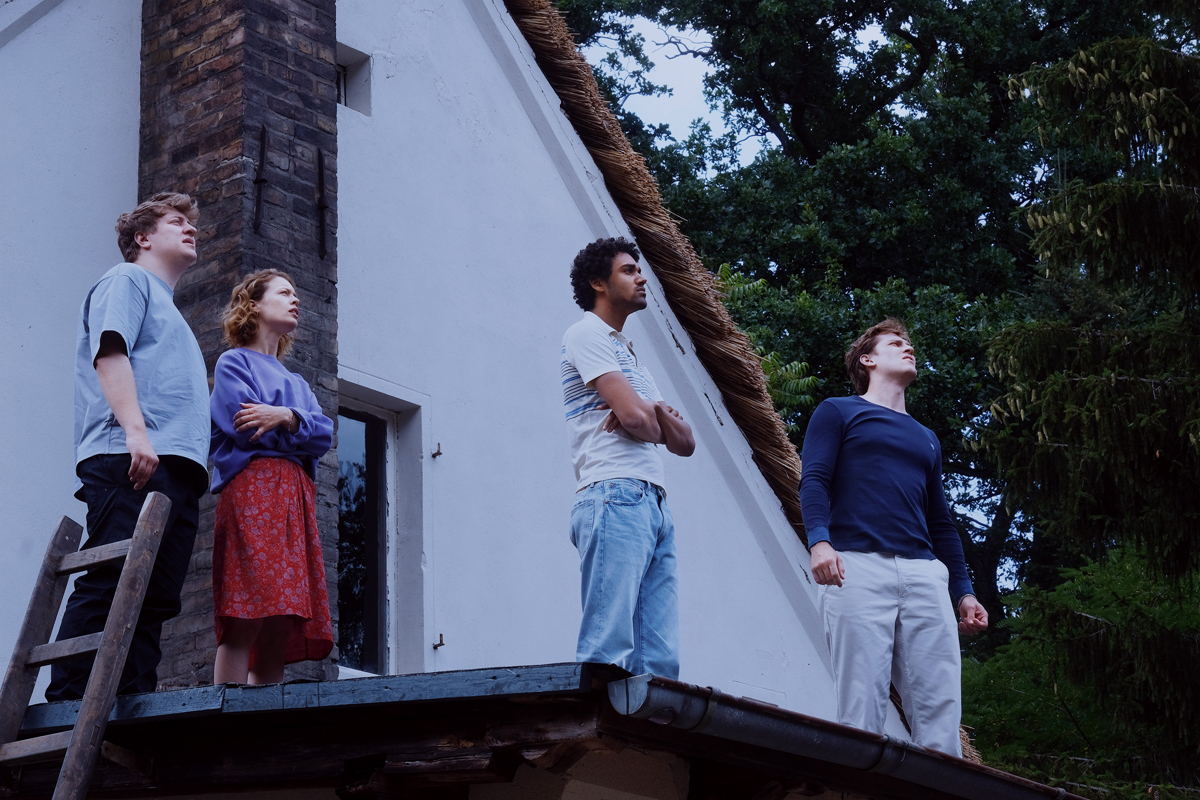
Thomas Schubert as Leon, Paula Beer as Nadja, Langston Uibel as Felix, and Enno Trebs as Devid in Afire. Courtesy Sideshow and Janus Films.
Afire, written and directed by Christian Petzold,
opening in theaters July 14, 2023
• • •
Many of the films of the German auteur Christian Petzold shrewdly examine the upheavals and pathologies of the twentieth century—particularly in his home country—and their lingering effects in the twenty-first. History—the Third Reich, the camps, Deutschland’s bisection, the Red Army Faction, reunification—often haunts his movies, however obliquely. Even Undine (2020), Petzold’s most fantastical feature to date, evokes the annals of atrocities. That film situates the mythological water nymph of the title in present-day Berlin, where she works as a historian of the city, giving lectures to tourists that include such remarks as “Just a few years after the war, hadn’t the term ‘national’ been forever discredited by National Socialism?”
Afire, Petzold’s latest, abandons those abiding themes altogether, a departure that proves disappointing. The focus this time is on a too-recognizable—more accurately, too-banal—figure: a twentysomething guy with extreme artistic ambition, as full of self-importance as self-loathing. Berliner Leon (Thomas Schubert), having published a well-received debut novel, is now putting the final touches on his second manuscript, work that he hopes to complete during a few weeks in June at the seaside vacation home belonging to the family of his pal Felix (Langston Uibel). Peevish and condescending, Leon calls to mind another exasperating character: Delphine (Marie Rivière), the neurotic, obstinate protagonist of Éric Rohmer’s The Green Ray (1986), just one of the many summer-holiday films by the French filmmaker that served as inspiration for Petzold’s movie. But Delphine, a secretary in Paris, exhibits none of Leon’s great-man grandiosity—a disposition from which the young writer rarely strays, to the point that his having any friends at all, much less attracting the interest of new acquaintances, almost strains credulity.
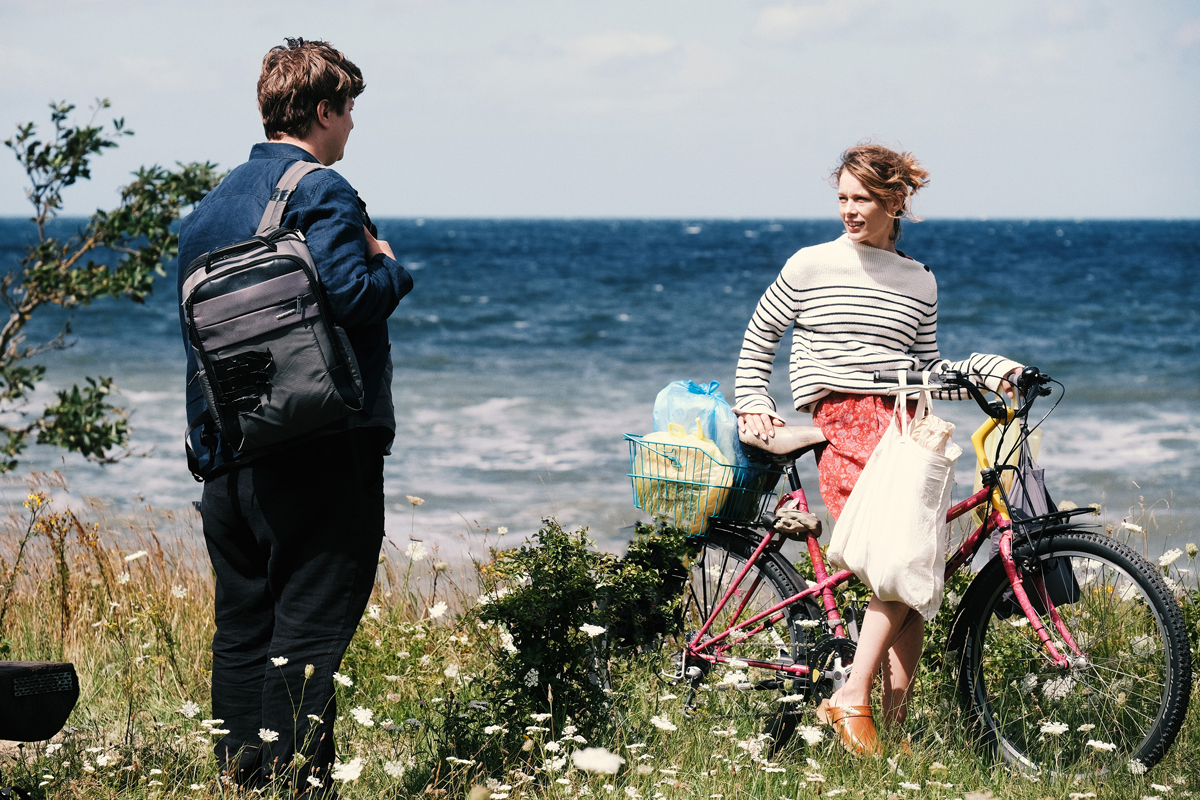
Thomas Schubert as Leon and Paula Beer as Nadja in Afire. Courtesy Sideshow and Janus Films.
The only time that Leon seems truly at peace occurs in the film’s opening seconds: he’s dozing comfortably in the passenger seat, fully relaxed as Felix drives them to the littoral getaway. That tranquility is broken by car trouble, a predicament compounded by no cell service to call a tow. While Felix quickly adapts to the setbacks, figuring out a shortcut to get to the summer home, Leon sulks, acting as if these inconveniences were a crucible meant to keep him from his holy pursuit. When another unexpected development arises—the young men arrive at the house to discover that a woman named Nadja (Paula Beer, in her third film with Petzold) has already installed herself, the result of a miscommunication between Felix and his mother—the tetchy novelist fumes further.
And the fuming never really stops; the word that Leon, a man of letters, utters most frequently is scheisse. Left to his precious revising, he is still miserable, perhaps realizing that his second book, burdened with the ludicrous title Club Sandwich, cannot be salvaged. Unyielding and uptight, Leon is surrounded by contemporaries who gladly avail themselves of summer’s freedom from structure and routine. Felix also has a looming deadline—a photography portfolio to finish for an art-school application—but he prioritizes estival leisure: long swims in the Baltic, sex, and languorous meals with friends, a circle that now includes Nadja and Devid (Enno Trebs), a lifeguard and one of Nadja’s recent bedmates.
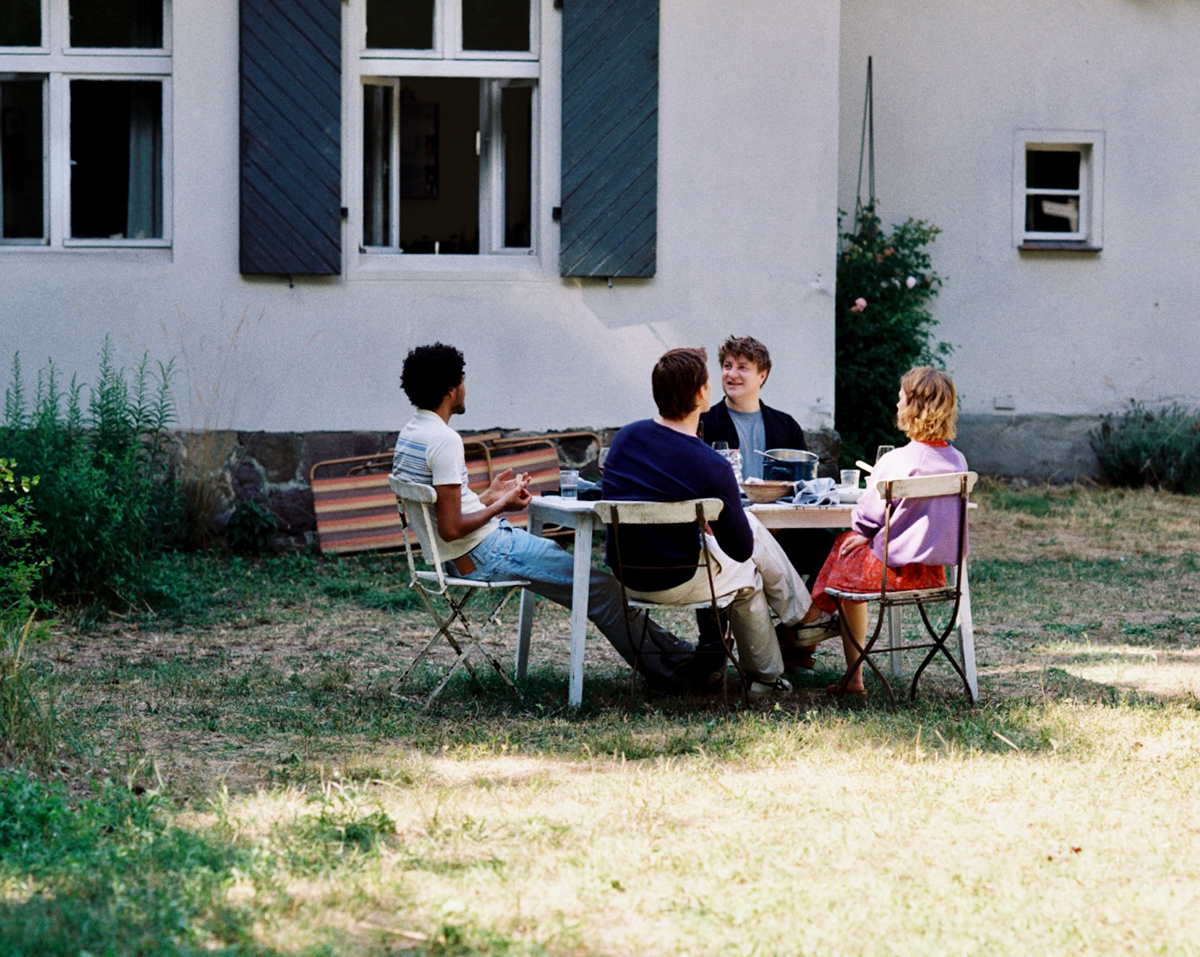
Langston Uibel as Felix, Enno Trebs as Devid, Thomas Schubert as Leon, and Paula Beer as Nadja in Afire. Courtesy Sideshow and Janus Films.
Any moment that Leon isn’t the center of attention is balm. A shaggy-dog story that Devid tells at one of those unhurried al fresco meals relieves us, all too briefly, of Leon’s grousing. Yet even while silent, his annoyance registers loudly through eye rolls and scowls. Why, then, during this episode, would Nadja, to whom Leon has been nothing but surly up to this point, be so eager to make eye contact with him, to solicitously gauge this grump’s responses to Devid’s meandering tale?
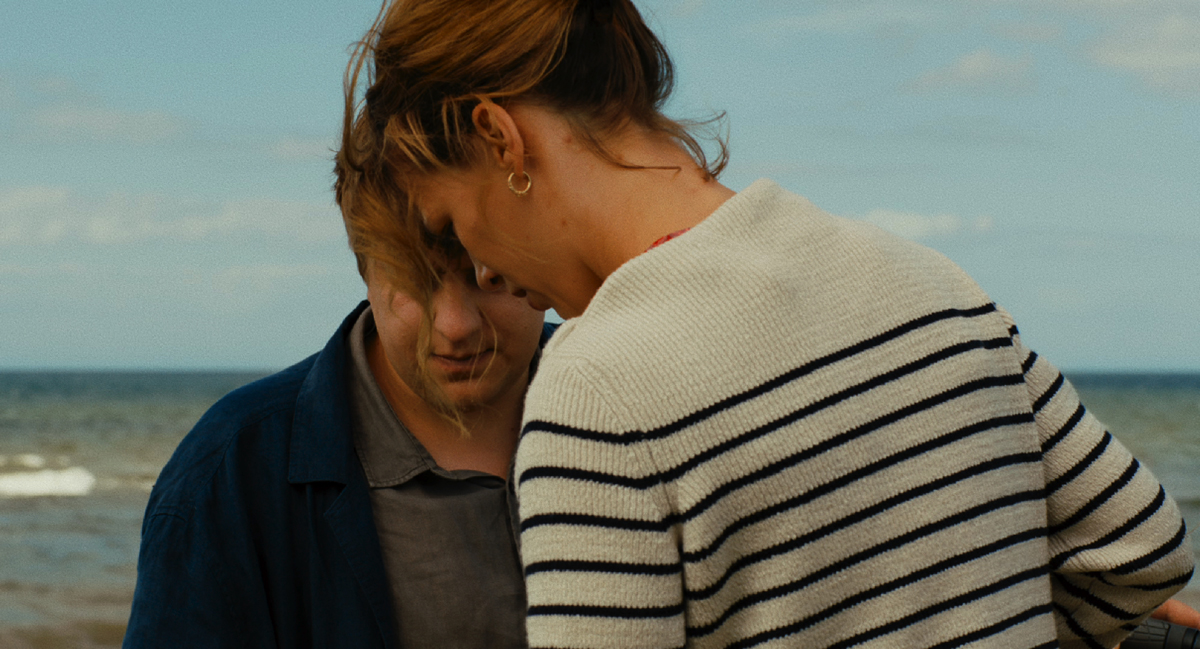
Thomas Schubert as Leon and Paula Beer as Nadja in Afire. Courtesy Sideshow and Janus Films.
Unsettled by my own tepid response to this movie, particularly since I’ve loved nearly all of Petzold’s prior films, I feared that my reaction revealed a deficiency on my part: a lack of imaginative sympathy, an inability to overcome my aversion to a character I found tiresome. Admittedly, there were moments in Afire when I did soften toward Leon, especially during those instances when he seems quite self-conscious about his bulky body—an anxiety that, much to the film’s credit, is never explicitly discussed. Felix, Nadja, and Devid comfortably reveal their trim physiques in various states of undress, while Leon is never not attired in somber-hued, flesh-covering garments; he wears black slacks and a jacket even while lying on the beach.
But these flashes of humanizing vulnerability do little to expand a one-dimensional portrait of indignation and arrogance. Leon might be thought of as a member of the same fraternal order that includes the troubled, once-promising writer played by Anders Danielsen Lie in Joachim Trier’s Oslo, August 31st, from 2011 (a significant movie for Petzold, who selected it for the carte-blanche sidebar that accompanied his retrospective at Film at Lincoln Center in 2018). Yet throughout Trier’s film, the protagonist, coming to terms with the pain he has inflicted on others, exhibits humility and inches ever closer to an understanding of his motives and desires, however self-destructive. Leon’s apologies and self-awareness, in contrast, arrive in Afire’s closing minutes, a hasty reversal that only further highlights the flatness of this character.
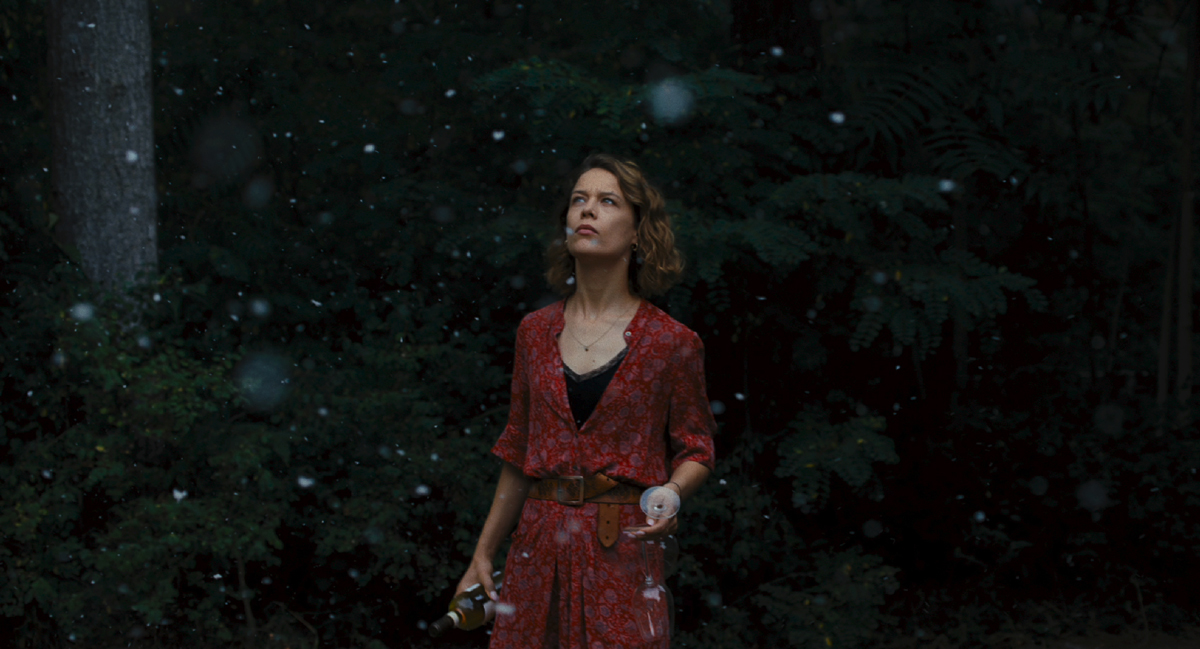
Paula Beer as Nadja in Afire. Courtesy Sideshow and Janus Films.
Typifying Leon’s solipsism is his almost blithe indifference to the conflagrations blazing through the forests that surround his summer lodging, to the whirring of helicopter blades constantly piercing the seaside calm. This nod to climate catastrophe gives the film a vague political aspect. But the generic signaling is dispiriting, since it comes from a director who has so sinuously addressed real-world crises before, as in Transit (2018), which managed to be both a faithful adaptation of Anna Seghers’s 1944 novel of the same name and a subtle, astute consideration of the labyrinthine obstacles facing migrants and asylum seekers in the EU today. Despite the title—a melodramatic reworking of the original Roter himmel, or “Red Sky”—nothing ignites in Afire.
Melissa Anderson is the film editor of 4Columns and the author of a monograph on David Lynch’s Inland Empire from Fireflies Press.